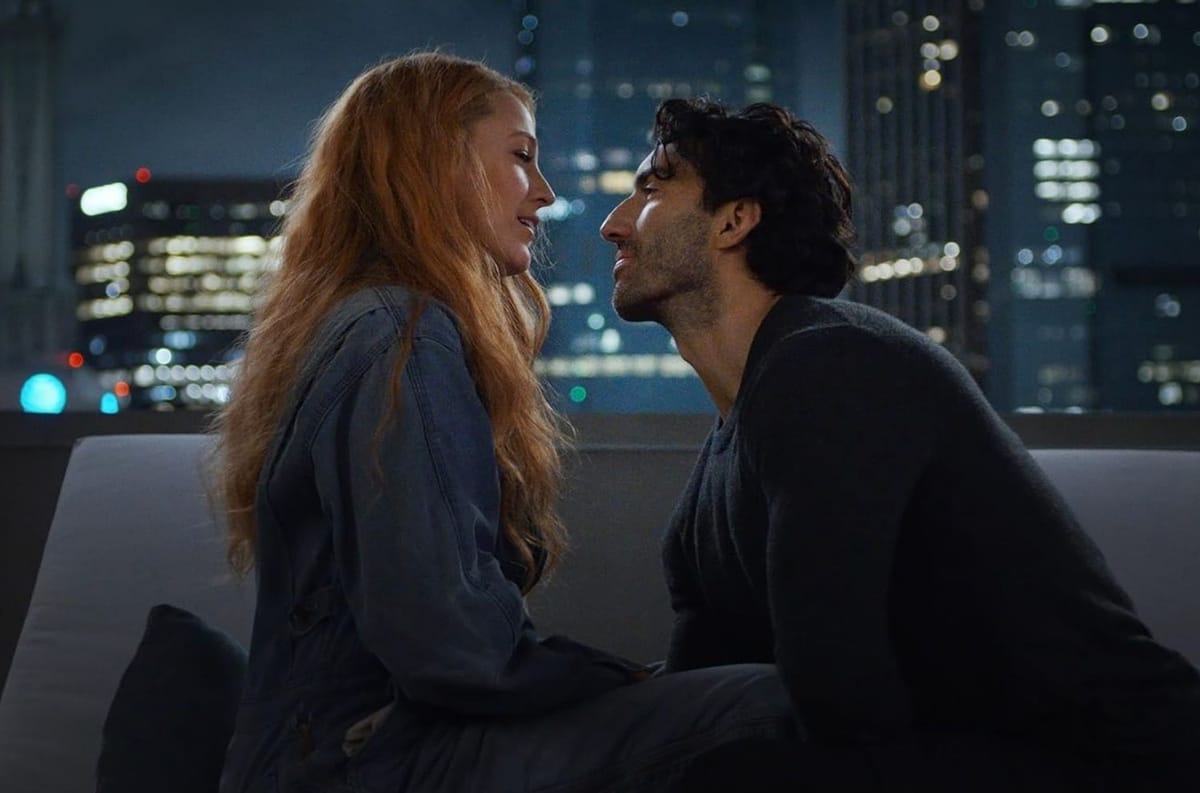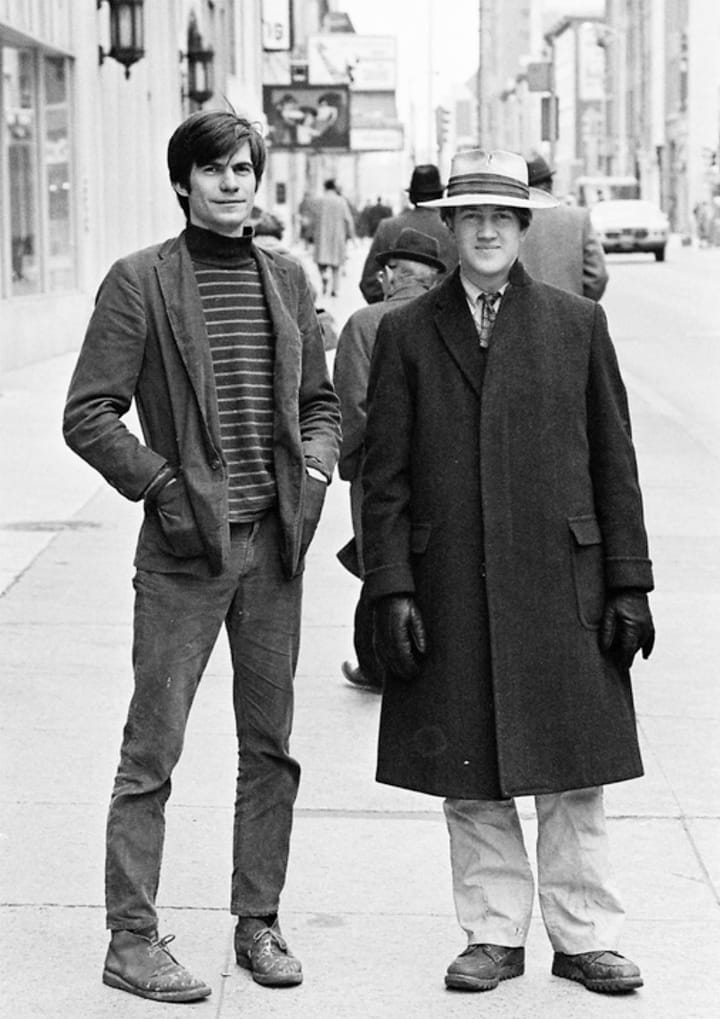The film says: “It Ends With Us”; The Cast Says, “Don’t You Start With Me”

One thing I can tell you, that Blake Lively sure can swim. Before we get into the squabbling referenced in the headline above, let’s just be clear on that. It’s a minor part of a skill set that’s making her a full-on star the old-fashioned way—she’s earning it.
Per the swimming, I was struck by her outracing a shark (in “Shallows”) with her desperate Australian crawl, and almost as much by the dogged doggy paddle she employs traversing a remote, frigid lake in “The Rhythm Method”. And don’t sleep on the elite form she displays as a blind person doing laps and water ballet in a pool in “All I See Is You.” Toss in some wet work in Oliver Stone’s savage “Savages,” and you start to see that Lively can go hard in almost any setting.
It can be such a tedious showbiz wheeze to tout an actor’s arrival at full stardom— but with the somewhat surprising success of “It Ends With Us” ($200+ million worldwide), why deny it? She had arrived as a much-touted center of the sassy CW series "Gossip Girl" in 2007, and though just turning 21, made the equally glammed-out cast look like mere kids. It was as if Gillian Anderson's tough murder cop Stella from "The Fall" had been set down in private school telling the others to fetch the bolt cutters.
But ahead of explaining all that, due consideration must tend to the much-bruited, but somehow still-mysterious squabble that did not end with the commercially happy end of “It Ends With Us”. The bare facts are tabloid fodder that remains a couple of squeezes short of juicy. Justin Baldoni—he of a four-season run on “Jane the Virgin” and a TED Talk titled “Man Enough: Undefining my Masculinity”—somehow alienated Lively and just about everyone else on the set and during a confrontative edit of the film. Lively has avoided his presence and any kind comments regarding him, even as she credited husband Ryan Reynolds with a key early scene’s dialog, and pitching on for both the shoot and the edit.
(Aside to whoever wrote that rooftop scene—have you heard from any neurosurgeons begging to differ that a brain sawbones would agree to scrub in to oversee urgent surgery in the OR while only, apparently, lightly stoned? Get the med students out of the room!)
Leave it to our journalistic brethren at the New York Post to dig in hard: “On the day of the movie’s release, multiple sources told Page Six that Baldoni made Lively feel “uncomfortable” about her postpartum body on set. (Lively made the film after welcoming her fourth child with Reynolds.)”
This blog is Team Blake, because Lord knows we need movie stars, but there are more carps. Some corrective P.C. commentators have inveighed against Lively’s choice to do breezy interviews largely ignoring the film’s darker, if late-arriving themes of domestic violence. (She then stepped up with links and thoughts online.)
Also online, Lively has used her current visibility to stoke a hair-care line and also her extant brand, fizzy soda company Betty Buzz, by selling “Betty Blooms,” a limited series of bouquets in Betty Buzz bottles. Further, a promo email hyping the movie slung “It End With Us”-themed cocktails using Betty Buzz and, don’t look so unsurprised, brand maven Reyonlds’ Aviation American Gin. (Given the pot-friendly rooftop scene he wrote, I hope they’re not putting clear liquids in pilots’ water bottles.) At an earlier stage she was the face of Gucci Premiere with a short film ad made by formerly maverick-ish director Nicholas Winding Refn. We can stop now, because, although the famous acting couple handed the reins of their 2012 wedding to Martha Stewart, who planted them in a former South Carolia slave plantation for the wedding and a Stewart-branded short film of the reception, Reynolds, with that humility Canadians readily simulate, apologized that the site "was a place built upon devastating tragedy.”
One of the elements of Lively’s stardom, along with her noble profile, is a remarkable figure, and she wears clothes with great elan—both in “It Ends…”, albeit in an enveloping way, and earlier with the hard-edged fashion choices of “A Simple Favor”’s terrifying, and equally magnetic, Emily.
When she self-reveals through an absurd comparison—“Mother Teresa and I are basically the same person”—it’s a short step to the current Vogue cover story that says pretty much the same. (Many loving quotes via the likes of Gigi Hadid, who shares a talent for…can we circle back to you on that?) The current piece as festooned with a sort of film treatment by director Baz Luhrman who—and who could have guessed—uses it to promote his currently shoorting-in-Rome, and co-starring Lively and great buddy Hugh Jackman,“A Simple Favor 2”.
The photo shoot is deeply luxe and perhaps most akin to the predecessor film (as opposed to “It Ends” where haute couture is wildly expensive, velour, pre-school-style pajamas), which means Lively will be garbed in a fashion to make the Julia Roberts of “Pretty Woman” look like a saddle tramp.
Let’s get to the film. (Leaving aside the music cues, which include family BFF Tay-Tay, whose track “I Bet You Think About Me” was promoted via a Lively-directed video edited by Shane Reid, who reports say controversially stepped in to help cut the “It Ends…” in a way the First Couple found more salubrious)
There’s an overarching point to this beyond a journo moaning about a movie star whose online profile contains a couple notorious smackdowns of interviewers who dared crack wise to her just once.
Just stop! Can we do that movie star part? She truly is an actor of force and subtlety who goes deep and with highly nuanced modulations of complex characters. When Paul Feig guides “A Simple Favor” from psychological thriller to something of a slaphappy bedroom farce with guns, her work with the also-gifted Anna Kendrick is revelatory. As a former Oxford girl thrown into the gutter by a family tragedy in “The Rhythm Section”, she has a convincing junkie’s pout and gait, and becomes a just-good-enough assassin. (She was effective as a moll in Ben Affleck’s The Town, and arresting in her close-ups both as the immortal-for-now title character in “Age of Adaline” and as a differently transformed being—blinded for some scenes by opaque contacts– in “All I See Is You”.) The underrated performances have rolled steadily about, but her return to the stardom ray this year after a spell of family-building has brought benefits.
Read, for example, Richard Brody’s review of the new film, citing Lively’s “wry grandeur” and while noting, “the many coincidences and unlikely accidents on which the story depends verge on the ridiculous” still finds “Lively, above all, is made for melodrama: even at her most wryly self-aware, there’s something inherently regal, even haughty, about her bearing…carrying a sense of secret destiny in her sly smile.”
Vanity Fair’s Richard Lawson evoked her “uniquely Livelian flair,” adding kudos for the movie‘s balance of traditional visual fluff with edgier hints that still anticipated later gravity: “Aiding tremendously in that careful sense of balance is Lively. It Ends With Us joins a growing roster of sturdy vehicles for an actor who is almost a kind of alternate-dimension movie star.”
The London Times all but put her in line as the next Neo, finding her “Perfectly cast and with that Keanu Reeves-style combination of self-consciousness, determination, and doubt that is wholly fitting for a character yearning to break free from the coercive clutches of those around her. And yes, it’s fundamentally soapy. But it’s a good kind of soap.”
Perhaps the best-articulated huzzahs came from San Francisco Chronicle’s Mick LaSalle, whose appealing 2012 book studying women in French cinema (“The Beauty of the Real: What Hollywood Can Learn from Contemporary French Actresses”) posits that “Today’s Hepburns, Davises, Crawfords, Garbos, and Stanwycks are not American. They’re French.” Like their American counterparts, he allows, French actresses generally tend to be beautiful, but all the more so because their inner qualities are allowed to shine through in the meaty three-dimensional roles they play.
Flash forward to La Salle’s review this month: “The big takeaway is that it confirms what 2020’s "The Rhythm Section" made clear: Blake Lively is a major talent.
One of the best onscreen thinkers, Lively’s thought processes are readable, original, and idiosyncratic. She is constantly surprising yet always true, and that combination is the mark of a star…it’s worth the journey because of Lively and her simultaneous and contradictory mix of pleasantness and cold discernment. it’s proof she really needs to work more. There’s the potential here to create a serious body of work.”
It's that skill set noted in part at the top of this post that may ensure LaSalle’s wish comes true. As an actor—let’s cast aside the P.R. peccadilloes for now—she will work at any craft learning curve they may challenge her with. In a casual (for once TV interview before she set off to do “The Rhythm Section” she was asked what her prep regime would be and she tossed it off—“Fights, guns, drugs, swimming.”
I’ll settle for that any day, but Lively has so much more to show and we should all look forward to seeing just what that is.





Comments ()